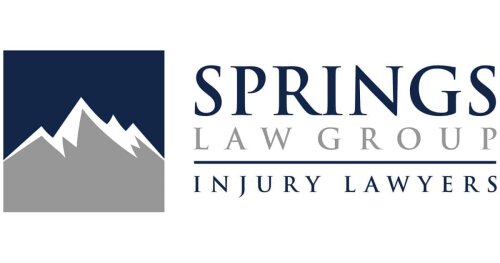Best Medical Malpractice Lawyers in Colorado
Share your needs with us, get contacted by law firms.
Free. Takes 2 min.
Or refine your search by selecting a city:
List of the best lawyers in Colorado, United States

About Medical Malpractice Law in Colorado, United States
Medical malpractice occurs when a healthcare provider, such as a doctor, nurse, or hospital, fails to provide the care that meets accepted standards, and this failure results in harm to a patient. In Colorado, medical malpractice is a complex area of law that focuses on protecting patients who have been injured due to the negligence or mistakes of medical professionals. These claims aim to help patients obtain compensation for medical bills, lost wages, pain, suffering, and other damages resulting from inadequate medical care.
Why You May Need a Lawyer
Medical malpractice cases can be highly complicated, involving detailed medical records, expert testimony, and intricate legal standards. You may need a lawyer if you have experienced:
- Mistakes during surgery or medical procedures
- Incorrect diagnosis or delayed diagnosis that led to harm
- Pharmacy errors or incorrect medication
- Birth injuries to mother or child
- Failure to obtain informed consent before a procedure
- Inadequate follow-up or aftercare resulting in injury
- Anesthesia-related errors
A medical malpractice lawyer can help determine if you have a valid claim, assemble the necessary evidence, work with expert witnesses, and represent you through negotiations or at trial. They also help navigate the strict deadlines and procedural requirements that apply to these cases in Colorado.
Local Laws Overview
Colorado has several specific laws that impact medical malpractice cases:
- Statute of Limitations: Generally, you must file a medical malpractice claim within two years of discovering the injury, but not more than three years from the date the alleged malpractice occurred. There are rare exceptions, such as for cases involving fraud or concealment.
- Certificate of Review: To proceed with a claim, Colorado law requires you to submit a certificate of review from a qualified medical expert within 60 days of filing your lawsuit. This expert must confirm that your claim has professional support.
- Caps on Damages: Colorado law limits non-economic damages, such as pain and suffering, to $300,000 in most cases. The total damages cap, including economic and non-economic damages, is $1 million, unless a court finds justifiable reasons to exceed this amount.
- Comparative Fault: If you are partially at fault for your injury, Colorado uses a modified comparative negligence rule. If you are found 50 percent or more responsible, you cannot recover any damages.
- Governmental Immunity: Claims against public hospitals or government-employed providers may have special notice requirements and damage caps under Colorado law.
Understanding these laws is essential for anyone considering a medical malpractice claim in Colorado.
Frequently Asked Questions
What qualifies as medical malpractice in Colorado?
Medical malpractice generally means a healthcare provider did not meet the accepted standard of care and the patient suffered harm as a result.
How long do I have to file a medical malpractice lawsuit?
In most cases, you must file within two years of discovering the injury but no more than three years from the date of the malpractice.
What is a certificate of review?
A certificate of review is a statement from a qualified medical expert that supports your claim. You must submit it within 60 days of filing your lawsuit in Colorado.
Who can be sued for medical malpractice?
Physicians, nurses, hospitals, clinics, dentists, chiropractors, pharmacists, and other licensed healthcare professionals can be sued for medical malpractice.
What damages are recoverable in a medical malpractice case?
You may recover damages for medical bills, lost income, pain and suffering, loss of enjoyment of life, and other related costs, but non-economic damages and total damages are capped by Colorado law.
Will my case need to go to trial?
Many medical malpractice cases are settled before trial, but some do proceed to court if an agreement cannot be reached.
Can I sue a state hospital or government-employed healthcare provider?
Yes, but special procedures and shorter deadlines may apply, and there may be different limits on the damages you can recover.
What if I was partially at fault?
You can still recover damages as long as you are less than 50 percent at fault, but your recovery will be reduced by your share of responsibility.
How do I find the right lawyer?
Look for attorneys with experience in Colorado medical malpractice law, positive client reviews, and a track record of handling similar cases.
What evidence will I need for my claim?
You will need medical records, documentation of your injuries and damages, expert opinions, and evidence showing that the provider’s care fell below accepted standards.
Additional Resources
If you need more information or assistance, consider consulting the following resources:
- Colorado Bar Association - Provides a lawyer referral service and information about your legal rights
- Colorado Medical Board - Handles licensing, complaints, and disciplinary actions for healthcare professionals
- Colorado Department of Regulatory Agencies (DORA) - Offers consumer protection information and regulatory oversight
- Colorado Division of Insurance - Assists with insurance matters related to medical malpractice claims
- Colorado Trial Lawyers Association - Organization of attorneys experienced in medical malpractice and personal injury cases
Next Steps
If you believe you may have a medical malpractice case in Colorado:
- Gather all medical records, bills, prescriptions, and any documentation related to your care and injury.
- Write down a detailed timeline of events, including symptoms, diagnoses, treatments, and conversations with healthcare providers.
- Contact a qualified medical malpractice attorney licensed in Colorado for a consultation. Many offer free or low-cost initial case reviews.
- Be prepared to discuss your case and share all relevant documents and information with your lawyer.
- Follow your lawyer’s advice regarding deadlines, evidence gathering, and communications with the involved healthcare providers.
Taking prompt action and seeking legal guidance as quickly as possible helps ensure your rights are protected and your claim is prepared within the time limits set by Colorado law.
Lawzana helps you find the best lawyers and law firms in Colorado through a curated and pre-screened list of qualified legal professionals. Our platform offers rankings and detailed profiles of attorneys and law firms, allowing you to compare based on practice areas, including Medical Malpractice, experience, and client feedback.
Each profile includes a description of the firm's areas of practice, client reviews, team members and partners, year of establishment, spoken languages, office locations, contact information, social media presence, and any published articles or resources. Most firms on our platform speak English and are experienced in both local and international legal matters.
Get a quote from top-rated law firms in Colorado, United States — quickly, securely, and without unnecessary hassle.
Disclaimer:
The information provided on this page is for general informational purposes only and does not constitute legal advice. While we strive to ensure the accuracy and relevance of the content, legal information may change over time, and interpretations of the law can vary. You should always consult with a qualified legal professional for advice specific to your situation.
We disclaim all liability for actions taken or not taken based on the content of this page. If you believe any information is incorrect or outdated, please contact us, and we will review and update it where appropriate.
Browse medical malpractice law firms by city in Colorado
Refine your search by selecting a city.












